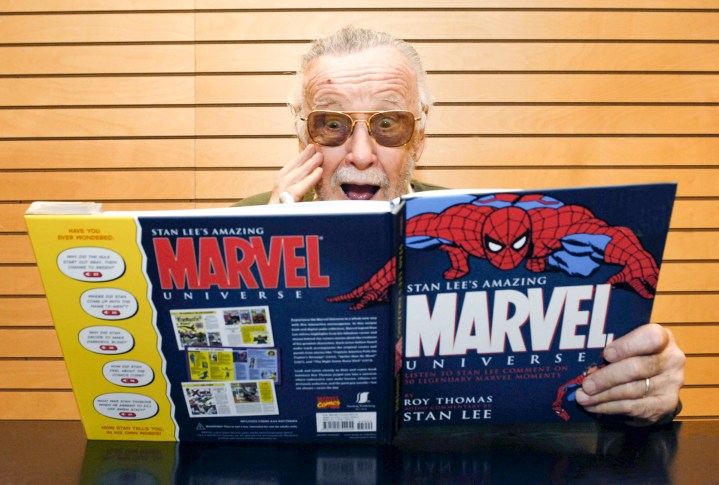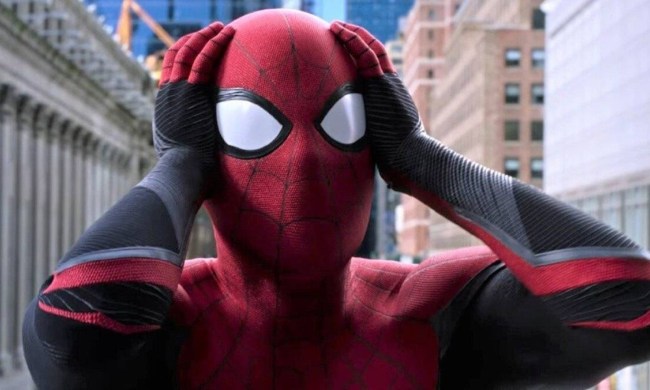
They say you should never meet your heroes.
I’m fortunate to have a career that’s given me the opportunity to meet many of the artists and creators I admire most, and that old adage proves true far too often. The people we put on a pedestal can be all too human at best, and at worst, taint our opinion of their work with a terrible encounter.
In this and so many other ways, however, Stan Lee was the exception to that rule.
I grew up with Marvel Comics stories. By the time I picked up my first comic (May 1983’s Marvel Team-Up #129), it had been years since Lee was a credited writer on an issue, but his creative fingerprint — and his name, for that matter — was all over Marvel’s comics. To read an adventure featuring Spider-Man, the X-Men, the Avengers, or countless other costumed heroes and villains was to read a tale populated by his creations and penned by writers and artists who also grew up with his work.
That indelible link between Lee and comics wasn’t lost on me, or on generations of other comic book readers, particularly as Lee’s public profile rose along with that of the medium. As comic books and their characters made the leap from page to screen, he was omnipresent in that evolution, shepherding the stories and characters along as the medium’s most recognizable elder statesman as well as its biggest fan.
That’s why it was so surreal, decades after I picked up my first comic, to find myself sitting in on a 2006 conference call between Lee and Brian M. Bendis, the writer and artist who served as the architect of Marvel’s comic book universe at that point. I was as an editor for a magazine covering the comics industry at that time, and the conversation between Lee and Bendis was intended to serve as the first installment of an ongoing interview series that brought together some of comics’ biggest names for informal chats about comics and storytelling.
It was also my first personal interaction with Lee, and it required every bit of willpower and professional courtesy I could muster to avoid lapsing into the sort of gushing adoration that comes from spending two decades immersed in worlds he created.
The conversation was a lengthy one, but one thing that struck me was the genuine enthusiasm Lee — 83 years old at that time — still had for comics and the characters that inhabited them. His inimitable way of speaking made him one of comics’ greatest spokespeople, and although he was always happy to discuss the formative years of Marvel and the characters he co-created with legends like Jack Kirby and Steve Ditko, certain topics seemed to inject a little more excitement into his voice.
Lee sounded years younger as he gushed about seeing characters he created in video games and on the big screen. Sam Raimi’s Spider-Man 2 had hit theaters just over a year earlier, and hearing Lee describe the experience of watching Peter Parker swing across Manhattan in his webbed costume made his nostalgia for the character feel as authentic as my own.
“The thing that I always think of is that, in a way, those movies are doing me so much good because they take these little stories that I did with [Jack] Kirby and with [Steve] Ditko and with [John] Romita and everyone else when we were just doing comic book stories and hoping that someone would buy the books, enabling us to keep our jobs and be able to pay the rent month after month,” said Lee. “But now suddenly they’ve become these wonderful things on the screen.”
To hear Lee discuss the future of comics and superheroes was to recall my own experiences with the fantastic adventures his imagination inspired, eagerly anticipating the next “nothing will ever be the same” narrative twist.
At a time when it’s all too common for bands to dismiss their most popular song, or for actors and directors to shy away from discussing the mainstream movie that made them a household name, Lee welcomed collective enjoyment of Spider-Man, the X-Men, Hulk, and so many other characters he co-created and had already spent so much of his life discussing.
As luck would have it, I was given the chance to take a more active role in conversations with Lee over the following years, and that positive first impression I had of him only grew stronger with each interaction.
After the June 2009 death of Michael Jackson, I found myself chatting with Lee about the iconic pop star during that year’s Comic-Con International in San Diego. He recalled Jackson visiting him with his son, Prince, and discussing Jackson’s desire to make a Spider-Man movie years before Raimi brought the character to the screen. His memories of Jackson were absent any mention of the pop star’s well-documented eccentricities or the peripheral effects of dealing with someone who might very well have been the most famous person in the world at that time.
Instead, his memories focused on the way Jackson treated his son.
“[Jackson] came to my house once with his son, and I remember my wife took care of his son for about an hour while Michael and I were talking,” he recalled in the conversation I had with him. “He was quite a good father … He cared very much for the boy.”
Lee’s empathy for Jackson was a nice reminder that, much like the characters he created for Marvel with a genuine emotional depth beneath their capes and cowls, there was a very real, very relatable person beneath the mantle of comics’ most iconic creator.
My conversations with Lee over the years covered a wide range of topics, and occasionally touched on some of the contributions he made to the comics world that aren’t as widely recognized.
A 1968 installment of Lee’s “Stan’s Soapbox” column found in each issue of Marvel’s comics has been making the rounds this week in the aftermath of his death. In the strongly worded column, Lee condemned bigotry and racism as “the deadliest social ills plaguing the world today,” and urges Marvel’s fanbase to “fill our hearts with tolerance.”
In 1968, Stan Lee used his Marvel "Stan's Soapbox” column to talk about the ignorance of racism. "Racism and bigotry are among the deadliest social ills plaguing the world today … Sooner or later, we must learn to judge each other on our own merits” https://t.co/3kowLk0WxT pic.twitter.com/Lw8FtxIyuk
— Ryan Parker (@TheRyanParker) November 12, 2018
Back in 2010, Lee called me up out of the blue while I was an editor for MTV News. He was interested in discussing a popular, fan-led campaign to cast Community actor Donald Glover as the new Spider-Man, as the debate over the idea of casting a non-white actor in the role of Peter Parker had polarized the comics community — a community that had become quite a bit larger with the recent success of Christopher Nolan’s Dark Knight trilogy and Marvel’s burgeoning cinematic universe. Lee wanted to set the record straight about how he, the character’s co-creator, felt about the notion of a Black actor as Spider-Man.
“As far as I’m concerned … anybody should have a chance to audition for the role,” he told me.
Lee explained that Peter Parker’s decision to don a full-face mask was an important aspect of the character, because for the people the web-slinging hero helped, it meant that he could be anyone under that mask. The color of his skin wasn’t important. It was what Peter Parker did that defined him and made him a hero.
Although Lee acknowledged that casting a non-white actor as Peter Parker might confuse some longtime fans of the character, his willingness to accept the idea of Glover as Spider-Man hinted at the sort of open-mindedness that informed that 1968 column and led Lee to co-create (with Kirby) mainstream comics’ first Black superhero, Black Panther. That Lee felt the need to chime in with his perspective on such a polarizing, charged debate speaks volumes about his character, and our conversation only affirmed the respect I had for him.
In later conversations, I would talk to Lee about reality television, real-life superheroes, and even social media. But it was those early encounters — beginning with one I was only a passive participant in — that helped transform the respect I had for him as a storyteller and creator of my favorite characters into a genuine admiration for him as a person. His life and career included more than a few questionable decisions, but his legacy was built on the joy he brought millions of people like me who found no shortage of delight, drama, and fond memories in the worlds he created.
“To me the greatest moments are when anyone says to me, ‘Gee, I love that story you wrote.'” said Lee at one point in that 2006 interview. “I mean, there is nothing that beats that.”
I’m eternally grateful to my weird career for putting me in Lee’s trajectory. I’ve had the good fortune of seeing that he often got as much joy from those experiences with the people who grew up with his creations as we did — and knowing that only made my own memories more special.
So, sure, they say you should never meet your heroes — but sometimes you’ll be happy that you did.




